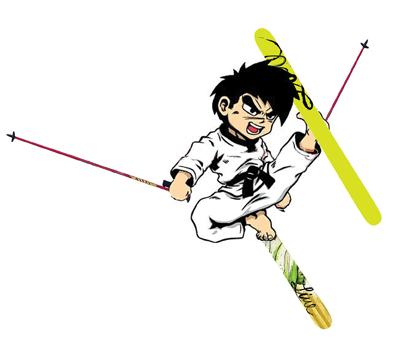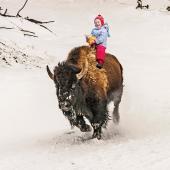Wax On
Martial arts training develops key areas of athletic fitness: strength, speed, agility, flexibility, and stamina. This is especially true of modern Taekwondo, with its noted emphasis on kicking. But did you know that martial arts training is also a good way to become a better skier?
A major conditioning factor in martial arts is that training tends to be intensive and interval-oriented. Students practice series of explosive movements, like jumps, lunges, sprints, kicks, or punches, then recover, and then repeat the sets. This kind of training, in addition to lots of calisthenics and core strengthening exercises, is ideal for the downhill skier or snowboarder.
And just as physical skills can transfer from sport to sport (or to other situations), so too can mental skills transfer from martial arts to skiing. In particular, the ability to know where your attention goes under stress and to shift attentional states as needed can be instrumental in skiing. You may shift gears more easily from zooming in on a specific danger (e.g., "damn that guy looks scary" or “wow that’s steep”) to a present-moment focus that includes how best to neutralize your opponent's strengths or exactly how to tackle the slope and where to make the turns.
Just as martial arts teaches mindful attention to external factors such as the opponent, the surroundings, and stance, skiers who study martial arts bring better focus to things like the consistency of the snow, visibility, the incline or aspect of a slope, and navigating specific obstacles. It's the same for internal factors, too. Martial arts students learn to visualize kicks and tactical approaches, as well as release pressure and listen to their bodies, and skiers who study martial arts are better able to visualize exactly where to make turns, be more sensitive to changing air temperature, and listen to their bodies.
The benefits don't stop at skiing, though. Studies show that if you become adept with visual attention in one sport, you are likely to transfer that skill to other arenas. For example, once after a workshop with a track team on development of mindful attention, one of my runners was the victim of a hit-and-run car accident. That runner told me that under extreme stress, his attention tends to go broad and internal (to thoughts and sensations of panic). He also told me that because we had been helping him recognize his different attentional states, his attention went where it needed to in that moment: narrow and external, on the license plate. Luckily, the runner was fine and police apprehended the other driver.
That's why using martial arts to develop mindful attention allows you to trust what you know you can do instead of worrying about what the mountain will do to you.
Brandon Saltz (Taekwondo West) will soon be testing for his 5th Dan in Taekwondo for which he will partly meet his requirements by collaborating with Tim Herzog (Reaching Ahead) on Mental Skills research.











